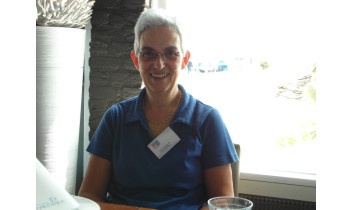
Why I love being a patient ambassador
My name is Betty Frankemölle and I live in The Netherlands, in a small town near the North Sea coast. I have always a lot of things to do.
I have been a volunteer at the Dutch Lung Foundation for over 12 ½ years and I am one of their patient experts. As a patient expert I have been involved in numerous patient activities. Some of these are attending the information and awareness meetings organised by the Dutch Lung Foundation, where people with a lung condition can exchange tips and tricks to help each other. And I love these meetings as it shows people that they are not alone with their condition. However, my main involvement is in:
- Evaluating research by PhD students from a patient’s perspective which is very interesting.
- Attending working groups and projects.
- Giving presentations as a patient expert.
In April 2013, I was asked by my patient organisation to try a new online training programme for patients and carers: the European Patient Ambassador Programme. I became very enthusiastic straight away. On the one hand it seemed to be very simple and easy to understand. On the other hand, by following the questions, it was very helpful to cope better with my own conditions - not only for my asthma but also for my intestine problems. That is why I recommended EPAP to the Dutch Ostomy Organisation. I also contacted the Dutch Patients Federation (which is an overarching organisation for all patient organisations in The Netherlands). Both organisations were very interested.
There is also a collaboration with PGO, a national umbrella organisation providing free training for patient organisations, and I have since then been asked by Kerstin to become the contact person for them, if they need to know any more information about EPAP for any patient organisations, who are interested in it.
For me, personally, EPAP helped me to make a progress in the quality of my voluntary work for the Dutch Lung Foundation. I gained more knowledge among other things about research decision making. I also gained more self-confidence in doing my voluntary work. Being better informed has helped in me in all of this in a big way.
Also, I completed EPAP before it was translated into Dutch, my native language, and this has helped me develop my English skills on top of my English course, which I pursue in my free time. I have now given presentations in English on quite a number of occasions!
On a recent occasion was leading a workshop with a fellow patient ambassador from the UK on EPAP and how it can help patients and patient organisations during the ERS International Congress in London – the biggest scientific congress on lung conditions in the world. This was quite a big occasion for me. I also presented on the patient experience at the international congress on chronic fatigue in Amsterdam in November, another big event for me.
About one year ago, Kerstin asked people who have done the EPAP modules to join the Patient Advisory Group. I was very interested because I like to use my experience and knowledge as a patient and as a former nurse. I still want to learn and discover things. This is a very good combination for me. So, now I really enjoy being involved in the decision making process for EPAP and helping to develop the new newsletter or comment on any new module.
I also enjoyed talking to other patient organisations and healthcare professionals about EPAP at the international congress on chronic fatigue in Amsterdam in November. This was very interesting. The healthcare professionals and scientists were very interested in my views. They admitted the patient’s role is still very poor, and that they are willing to give the patient a bigger role. Due to my story they became more aware about the role a patient (ambassador) can play. We are able to talk to them equally. They also noticed what an impact fatigue has in daily life. I told them I always have to plan my activities otherwise I am not able to do as much as I do now. They were shocked. Some scientists asked me to keep in touch if they have something to ask or discuss. They are eager to get feedback. I hope they ask other patients too to give feedback.
My conclusion: scientists are willing to work with patients, but they do not exactly know the possibilities. We have to make them aware of these. A lot of work to do for all of us.
Betty Frankemölle
Heemskerk, The Netherlands, December 2016